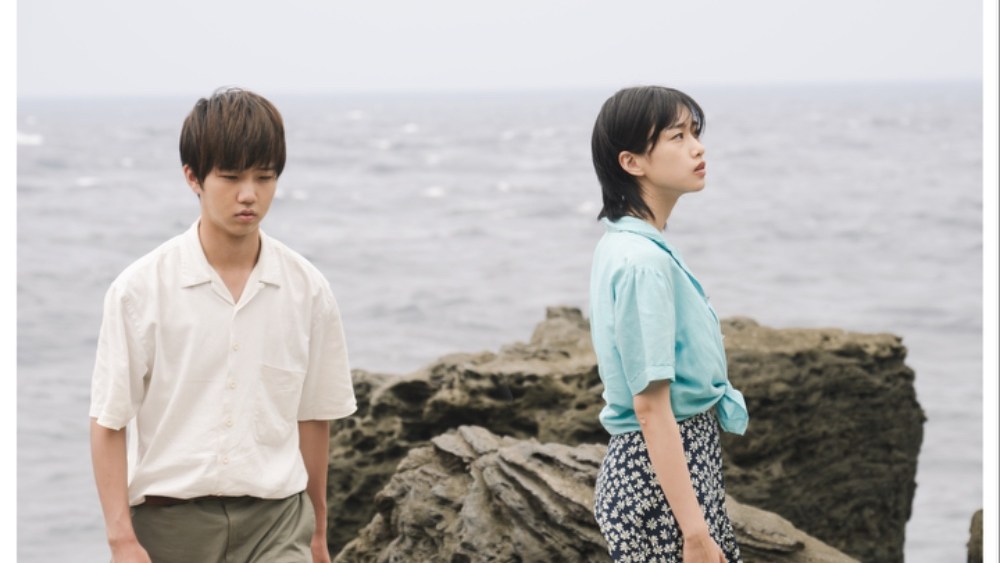Three years ago, Japanese director Shô Miyake enjoyed an arthouse breakthrough with his gorgeous, unconventionally delicate boxing movie “Small, Slow But Steady”; two features later, that title looks more and more like an announcement of Miyake’s own filmmaking credo. All three adjectives apply to his latest, “Two Seasons, Two Strangers,” though it’s more jagged and peculiar than that description might imply on its own. Playfully reorienting the viewer as it shifts from a contemplative film-within-a-film — depicting a fleeting connection between two strangers in a seaside village — to the equally low-key reality of that film’s shy, adventure-seeking writer, it’s a tale light on incident but rich, per its title, in doublings, parallels and reflective surfaces, layered to entrancing, cumulatively moving effect.
A deserving winner of the top prize in the main competition at the Locarno Film Festival — a boon to the distribution prospects of this unassuming mood piece — “Two Seasons, Two Strangers” is adapted by Miyake from “Mr. Ben and His Igloo” and “A View of the Seaside,” two short 1960s works by revered manga artist Yoshiharu Tsuge. The director and his DP Yuta Tsukinaga honor the material’s original form with their crisp, panel-like Academy-ratio framing, while the disconnect between the two sources is deftly built into Miyake’s own script, which opens on Li (Shim Eun Kyung), a Korean writer based in Japan, making a rudimentary start to a screenplay: “Summer, seaside. A car at a dead end.”
From there, we’re immersed into the sparse story she’s writing, following two young loners — Natsuo (Mansaku Takada) and Nagisa (Yuumi Kawai) — at respectively loose ends in a sleepy coastal town where he’s visiting family and she’s just idly visiting, each nursing their own sadness. There’s a late-summer air of exhaustion to the place, where the threshing of strong winds through lush foliage vies with the dull roar of the ocean for prominence in Takamitsu Kawai’s intricate sound design, while Tsukinaga paints in brilliant, pregnant blues, present in everything from sky and sea to Nagisa’s chic, flimsy wrap dress and the undertone of the characters’ skin on an unseasonally cool day. And that’s before the strangers, having tentatively met on a deserted cove, go for a sensually saturated swim in a heavy rainstorm, the camera bobbing with them in the rowdy waves.
“When people have too much free time, they think about things too much and get depressed,” says Natsuo to Nagisa — better, perhaps, to act rashly and often, and reap the sensory benefits. With this observation, it would seem, Li is speaking through her characters: Depressive and adrift herself, she’s both creatively blocked and at risk of becoming a passive observer in her own life. At a Q&A following a screening of the film we’ve just dipped into, she dodges questions by flatly denying she any talent; later, asked what she’s working on next, she admits a planned script about ninjas has come to a halt. “The things and feelings that used to be fresh have been been overtaken by words,” she says. “I’m in a cage of words.”
What Li needs is the kind of journey on which she sets her characters, short on words and long on unfamiliar environs and feelings. With one graceful cut to black, several months pass; we emerge from darkness out of a railway tunnel on a train slicing through the brilliant white landscape of Japan’s snow country in midwinter. Deposited at a small tourist town, Li finds much to snap with the camera she now devotedly carries everywhere, but no free hotel rooms; she’s directed up the hill to a rustic, off-the-radar inn run by taciturn divorcé Benzo (Shinichi Tsutsumi). He turns out to be something of a kindred spirit, likewise awaiting a new chapter in a life he’s let run aground.
Their tentative bonding is the less sexy, more specifically wounded version of the brief encounter Li wrote in the film’s first half. Creative fires are gently stoked; personal balance is restored. Miyake has a wonderful eye and ear for small, perfect details of everyday serenity: Steam rises off a bowl of udon noodles slurped in silence one frosty afternoon, while snow gives way underfoot with a pleasingly muffled crunch and grumble. Cages of words are unlocked with a look, a nod or the settled stance of a cat in the window. “Two Seasons, Two Strangers” revels in the kinds of experiences that most storytellers wouldn’t deem remarkable, though it unassumingly articulates what can be life-changing, or even life-saving, about them.

